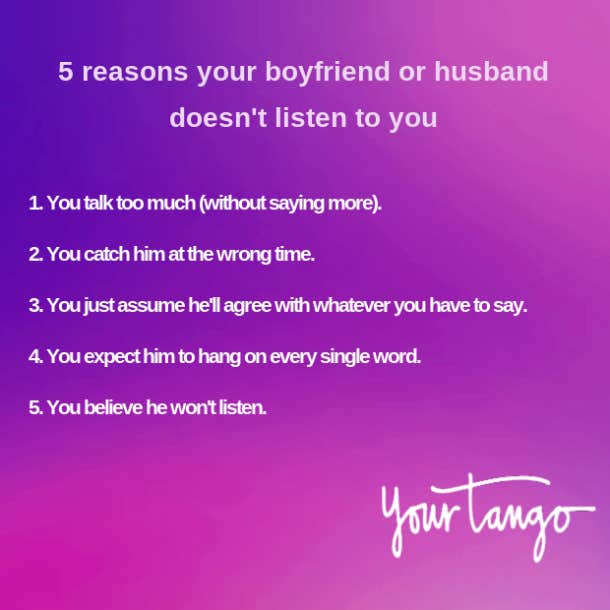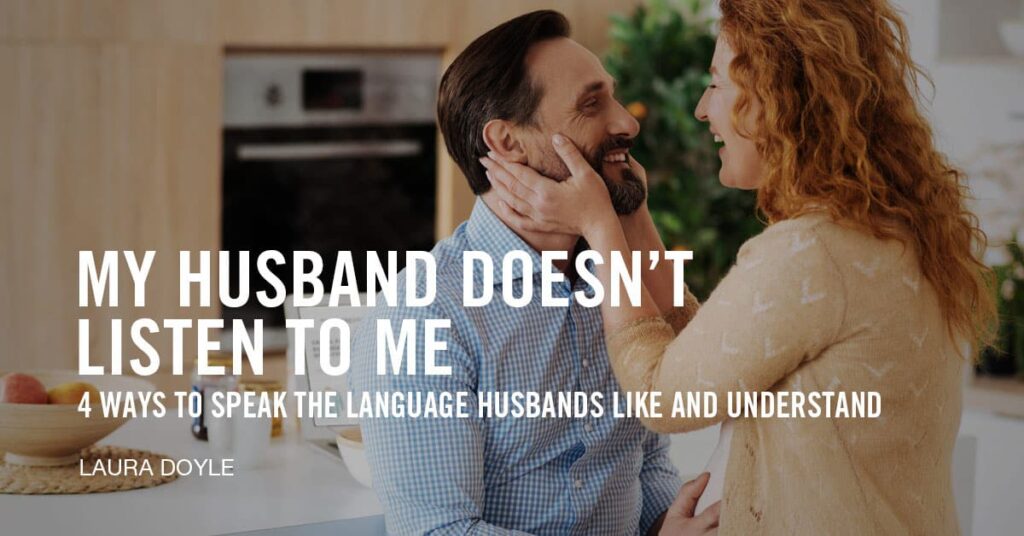
Have you ever found yourself frustrated and asking, “Why doesn’t my partner listen to me?” It can be incredibly disheartening when you feel like your words are falling on deaf ears. In this article, we will explore the common reasons behind this communication breakdown, offering insights and practical tips to help you reconnect and effectively communicate with your partner.
Understanding Communication Patterns
Communication is a fundamental aspect of any relationship, but it can often be challenging to truly understand one another and feel heard. One potential reason for this is the different styles of communication that individuals bring into a relationship. Each person may have their own preferred way of expressing themselves and listening to others. It is important to recognize and respect these differences in order to foster effective communication.
Different Styles of Communication
People have various communication styles, influenced by their upbringing, cultural background, and personal experiences. Some individuals may be more direct and assertive, while others may prefer a softer and more indirect approach. These differences can cause misunderstandings and misinterpretations if not addressed properly. By understanding and appreciating each other’s communication styles, you can improve your ability to connect and communicate effectively.
Emotional Barriers to Listening
Listening is a crucial component of effective communication, yet emotional barriers can often hinder our ability to truly listen to our partners. Emotional barriers, such as defensiveness, anger, or fear, can prevent us from fully understanding and empathizing with our partners’ perspectives. It is important to create a safe and non-judgmental space where both partners feel comfortable expressing their emotions and concerns without fear of being shut down or invalidated.
Lack of Interest or Attention
Another reason why your partner may not be listening to you is simply because they may not be genuinely interested or paying attention. In today’s fast-paced world, it is easy to become distracted by external factors, technological devices, or personal concerns. It is crucial to set aside dedicated quality time for communication, free from distractions and interruptions. By being fully present and engaged, both partners can demonstrate their respect and commitment to open and attentive communication.
Unresolved Conflicts and Resentment
Unresolved conflicts and resentment can poison communication in a relationship and prevent meaningful dialogue from taking place. These issues can stem from various sources, such as unresolved past issues or a lack of emotional intimacy.
Unresolved Issues from the Past
Past unresolved issues can resurface in the present and hinder effective communication. If there are unresolved conflicts or lingering hurt from the past, it is essential to address them openly and honestly. Ignoring or avoiding these issues will only perpetuate the cycle of miscommunication and hinder the growth of the relationship. Seeking couples counseling or mediation can provide a safe space to explore and address these unresolved issues.
Lack of Emotional Intimacy
Emotional intimacy is the foundation of a healthy and connected relationship. Without emotional intimacy, partners may struggle to truly understand and empathize with one another’s feelings and needs. This lack of emotional connection can obstruct effective communication, as both partners may feel unheard or unimportant. Building emotional intimacy requires vulnerability, trust, and open communication about feelings and needs.
Building Resentment
Resentment can build over time if conflicts or emotional needs are consistently left unaddressed. This resentment can lead to a breakdown in communication, as one or both partners may feel unheard, dismissed, or unappreciated. It is crucial to address resentments early on and work towards resolving conflicts and meeting each other’s needs. This can be achieved through open and honest communication, empathy, and a willingness to compromise.

This image is property of www.yourtango.com.
Distractions and Time Constraints
Modern life is filled with numerous distractions and time constraints that can hinder effective communication within a relationship. These external factors and busy lifestyles can make it difficult for partners to truly connect and engage with each other.
External Factors and Distractions
External factors, such as work demands, household responsibilities, or personal commitments, can easily divert attention and prevent effective communication. It is important to create boundaries and carve out dedicated time for communication without these distractions. Schedule regular date nights or quality time where both partners can focus solely on each other and their relationship.
Busy Lifestyle and Time Constraints
In today’s fast-paced world, many individuals lead busy and hectic lives. Time constraints can limit the amount of quality time available for partners to connect and communicate. It is important to prioritize your relationship and make time for open and honest dialogue. This may require restructuring schedules or reevaluating priorities to ensure that communication is given the attention and importance it deserves.
Unhealthy Power Dynamics
Unhealthy power dynamics within a relationship can contribute to a breakdown in communication. Power imbalances, dominant or controlling behavior, and a lack of mutual respect can prevent open and honest dialogue.
Dominant or Controlling Behavior
When one partner consistently dominates the conversation and disregards the input or feelings of the other, effective communication becomes compromised. Power imbalances can manifest through dominant or controlling behavior, which shuts down the voices of others and creates a climate of fear and submissiveness. It is important to foster an environment of equality and respect, where both partners have an equal opportunity to express themselves and be heard.
Lack of Mutual Respect
Respect forms the foundation of any healthy relationship, and its absence can greatly hinder communication. If one partner lacks respect for the other’s opinions, emotions, or boundaries, open and effective communication cannot thrive. It is essential for both partners to value and respect each other as individuals with unique perspectives and needs.
Fear of Vulnerability
Fear of vulnerability can also impede effective communication. One or both partners may be hesitant to express their true thoughts and emotions out of fear of judgment, rejection, or emotional harm. Building trust and creating a safe space for vulnerability is crucial for overcoming this fear and fostering open and honest communication.

This image is property of lauradoyle.org.
Misunderstandings and Assumptions
Misunderstandings and unfounded assumptions can lead to miscommunication and strain within a relationship. It is important to approach communication with openness and a willingness to clarify and understand.
Jumping to Conclusions
Jumping to conclusions without seeking clarification can lead to misunderstandings and misinterpretations. Assuming you know your partner’s thoughts, feelings, or intentions without actively listening and seeking clarification can create unnecessary conflict and damage trust. It is crucial to approach communication with curiosity and a genuine desire to understand your partner’s perspective.
Failure to Clarify
Failure to clarify can also contribute to misunderstandings. If something your partner said or did leaves you feeling confused or upset, it is important to seek clarification rather than making assumptions. Ask open-ended questions, encourage your partner to elaborate, and actively listen to their responses. By seeking clarity, you can prevent misunderstandings from snowballing into larger conflicts.
Assumptions and Stereotypes
Assumptions and stereotypes can cloud communication and prevent genuine connection and understanding. It is essential to challenge your own assumptions and biases and approach communication with an open mind. By actively listening and seeking to understand your partner’s point of view, you can break free from the constraints of preconceived notions and build a more open and empathetic form of communication.
Communication Skills and Emotional Intelligence
Developing effective communication skills and emotional intelligence is crucial for fostering healthy and meaningful interactions within a relationship.
Active Listening
Active listening is a fundamental component of effective communication. It involves fully engaging with your partner’s words, nonverbal cues, and emotions, without interrupting or formulating a response in your mind. Practice active listening by repeating and summarizing what your partner has said, asking open-ended questions, and showing genuine interest and empathy.
Empathy and Understanding
Empathy and understanding are essential for fostering connection and resolving conflicts. Put yourself in your partner’s shoes and strive to genuinely understand their thoughts, emotions, and experiences. Validate their feelings and demonstrate empathy through supportive gestures and active engagement. By fostering a sense of understanding, you can create a safe and supportive environment for open and honest communication.
Effective Expression of Needs
Being able to effectively express your needs and concerns is crucial for healthy communication. Clearly and assertively communicate your thoughts, emotions, and desires, using “I” statements to avoid accusatory language. By expressing your needs in a calm and respectful manner, you can create a space for open dialogue and problem-solving.

This image is property of i0.wp.com.
Past Trauma and Emotional Baggage
Past trauma and emotional baggage can significantly impact an individual’s ability to engage in effective communication within a relationship.
Impact of Past Trauma
Past traumas, such as physical or emotional abuse, neglect, or significant loss, can have a lasting impact on a person’s ability to trust and communicate openly. Trauma survivors may display avoidance behaviors, struggle with vulnerability, or have difficulty expressing their emotions. It is important to approach these individuals with patience, sensitivity, and a willingness to support their healing journey.
Unresolved Emotional Baggage
Unresolved emotional baggage, such as unresolved grief, anger, or past relationship issues, can interfere with effective communication. Emotional baggage can create emotional barriers, preoccupy thoughts, and trigger defensive or unhealthy communication patterns. Engaging in self-reflection, seeking therapy, and actively working towards processing and resolving emotional baggage can lead to healthier communication and stronger emotional connections.
Seeking Professional Help and Mediation
In some cases, seeking professional help and mediation may be necessary to navigate communication challenges within a relationship.
Couples Counseling
Couples counseling provides a safe and structured environment for partners to explore their communication patterns, express their needs, and work towards resolution. A trained therapist can facilitate healthy dialogue, offer guidance, and provide tools and strategies for effective communication and conflict resolution. Couples counseling can help rebuild trust, foster understanding, and create a stronger foundation for the relationship.
Mediation and Conflict Resolution
If conflicts persist and communication remains challenging, mediation can offer a neutral, third-party perspective to help facilitate productive and respectful communication. Mediators are trained in conflict resolution techniques and can guide couples towards mutually beneficial solutions. Mediation can help uncover underlying issues, improve communication skills, and restore trust and understanding within the relationship.

This image is property of abbymedcalf.com.
Reflecting on Self-Communication
Effective communication within a relationship starts with self-awareness and self-reflection. Examining your own communication patterns and skills can greatly improve your ability to connect and engage with your partner.
Self-Expression and Assertiveness
Developing self-expression and assertiveness skills is crucial for effective communication. Take the time to understand your own thoughts, emotions, and needs, and practice expressing them assertively and respectfully. By honing your self-expression skills, you can better communicate your desires and boundaries, and encourage open and honest dialogue within the relationship.
Examining Individual Listening Skills
Listening is not solely the responsibility of the speaker; the listener also plays a vital role in effective communication. Reflect on your own listening skills and consider how you can improve them. Focus on being fully present, eliminating distractions, and demonstrating genuine interest and empathy towards your partner’s thoughts and emotions. Strengthening your individual listening skills will enhance overall communication within the relationship.
Developing Strategies for Effective Communication
Developing strategies for effective communication is essential for overcoming communication barriers and promoting healthy dialogue within a relationship.
Setting Communication Goals
Setting communication goals can help guide your interactions and create a more intentional and productive communication dynamic. Identify areas of improvement and establish specific goals related to active listening, empathy, assertiveness, or conflict resolution. Regularly reassess these goals and celebrate incremental progress.
Establishing Safe Spaces
Creating safe spaces within the relationship is vital for open and honest communication. Establish guidelines that ensure both partners feel respected, heard, and validated during discussions. These guidelines may include using non-judgmental language, avoiding interrupting or belittling each other, and focusing on understanding rather than winning arguments.
Setting Boundaries
Setting boundaries within a relationship is essential for maintaining healthy communication. Clearly define and communicate your personal boundaries regarding topics of discussion, time allocated for communication, and emotional or physical space. Respecting each other’s boundaries fosters trust, respect, and a sense of safety within the relationship.
In conclusion, understanding communication patterns within a relationship is crucial for promoting healthy and meaningful interactions. By recognizing different communication styles, addressing emotional barriers, and tackling unresolved conflicts and resentments, you can foster effective communication. Additionally, acknowledging and addressing distractions, unhealthy power dynamics, misunderstandings, past traumas, and emotional baggage can further enhance communication within a relationship. Developing strong communication skills, seeking professional help and mediation when necessary, reflecting on self-communication, and implementing strategies for effective communication can all contribute to building stronger connections and healthier relationships. Remember, open and honest communication is the key to fostering understanding, empathy, and mutual growth.






